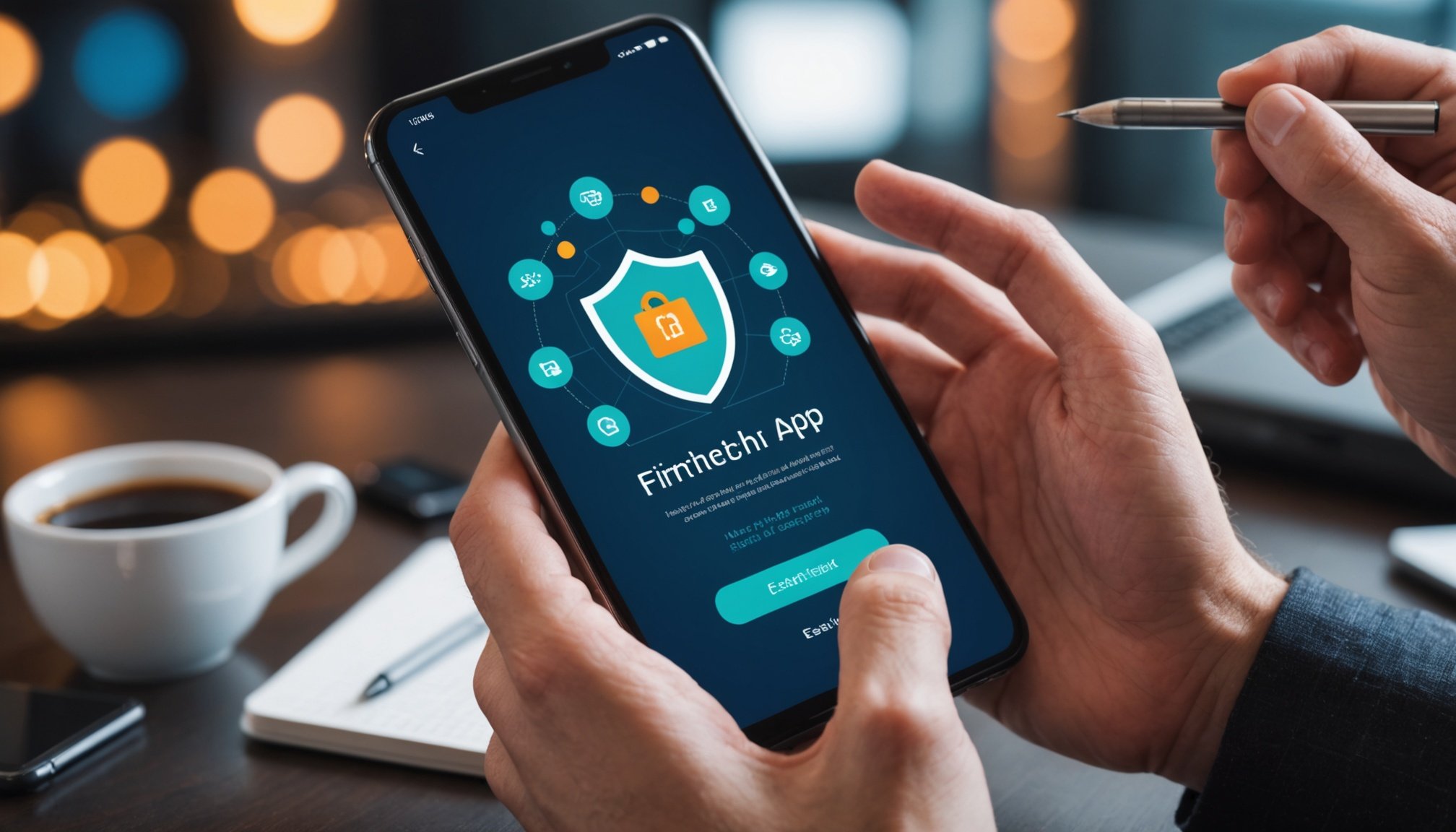Understanding the Importance of Mobile App Security in UK Fintech
The UK fintech landscape has emerged as a global leader, primarily driven by the rapid adoption of innovative mobile apps. From banking to personal finance, these apps have woven themselves into the fabric of daily financial transactions, providing both accessibility and convenience.
However, with great power comes great responsibility. Recent statistics underscore the importance of mobile app security, showcasing concerning trends in security breaches. These breaches can have far-reaching implications, not only causing financial losses but also damaging customer trust and tarnishing company reputations. In 2022 alone, UK fintechs witnessed a significant number of attempts to infiltrate mobile app security systems, spotlighting the urgency for robust security measures.
In parallel : Maximizing supply chain performance: harnessing predictive analytics for enhanced efficiency in uk fmcg companies
Navigating this complex landscape are UK regulations designed to ensure adequate standards are met. Frameworks such as GDPR and the UK Cyber Essentials Scheme play pivotal roles in governing mobile app security, mandating stringent criteria to protect user data and mitigate risks associated with cyber threats. By adhering to these regulatory frameworks, fintech companies can not only protect their users but also solidify their position as trustworthy entities in a highly competitive market.
Risk Assessment and Management Strategies
In the ever-evolving landscape of fintech, understanding and mitigating risks associated with mobile app usage is paramount. Risk management begins with a comprehensive threat assessment to pinpoint vulnerabilities. Common risks may include data breaches, unauthorised access, and transaction fraud.
In parallel : Harnessing ai potential: transforming demand forecasting for the uk fmcg sector
So, how can organisations effectively manage these concerns? Start by conducting meticulous assessments. Gather data on potential threats and evaluate the impact and likelihood of each. This proactive approach not only reveals existing weaknesses but also guides the development of robust security protocols.
Once threats have been assessed, implementing tailored strategies is crucial. These may include multi-factor authentication, data encryption, and continuous monitoring to detect unusual activity. Furthermore, regular updates and employee training on best practices can further reinforce security layers.
Moreover, crafting a thorough contingency plan is essential to prepare for potential breaches. What if a breach does occur? Establish clear procedures to minimise damage. This includes data backups, real-time alert systems, and a dedicated team for incident response. By having these plans in place, businesses can ensure a swift and efficient reaction, mitigating the scope of any security event and maintaining user trust.
Regulatory Compliance for UK Fintech Companies
Navigating the landscape of regulatory compliance is crucial for UK fintech companies, especially when it comes to mobile app security. The General Data Protection Regulation (GDPR) and guidelines from the Financial Conduct Authority (FCA) are particularly influential in shaping operational standards.
Adhering to GDPR ensures that companies handle personal data with utmost care, securing user information and privacy. This involves implementing stringent data processing rules, providing clear and concise privacy policies, and obtaining explicit consent from users before data collection.
Ensuring Compliance
Achieving compliance with GDPR and other relevant regulations requires a proactive approach. Companies should:
- Conduct regular audits to identify potential vulnerabilities and rectify them promptly.
- Implement robust data encryption protocols to protect sensitive information.
- Provide continuous training for employees on compliance best practices to ensure awareness and understanding of legal obligations.
The Role of the Financial Conduct Authority
The FCA plays a pivotal role by setting forth conduct rules that fintech firms must follow. These include maintaining high standards of integrity in financial promotions and ensuring that financial products are safe for consumers. Continually updating procedures and staying informed about regulatory changes are essential strategies for maintaining compliance and establishing trust with users. Regular updates not only improve security but also demonstrate a commitment to best practices and consumer protection.
Advanced Security Technologies
In the digital world, robust security technologies are essential to protect sensitive information. Implementing encryption is a fundamental practice. This involves converting data into a code to prevent unauthorized access. Encryption ensures that data, whether at rest or in transit, is safeguarded from potential breaches. Secure coding practices, on the other hand, help in identifying and correcting vulnerabilities during the development phase, significantly reducing the risk of exploitation.
Moving further, two-factor authentication (2FA) provides an additional layer of security by requiring two forms of verification before granting access to an app. This approach strengthens security by combining something the user knows (like a password) with something they have (such as a smartphone or security token).
Biometric security adds a personalised touch to user verification. By using unique biological attributes like fingerprints or facial recognition, biometric authentication offers a high level of precision in confirming user identity. The integration of biometric systems in security protocols not only enhances protection but also simplifies the login process, making it more user-friendly.
These technologies, when combined effectively, create a robust security infrastructure that not only protects sensitive data but also enhances the overall user experience by making security protocols intuitive and efficient.
Best Practices for App Development and Maintenance
In the dynamic world of app development, adhering to secure coding standards is paramount. Secure coding involves designing software with a focus on reducing vulnerabilities. By doing so, developers can prevent malicious exploits and ensure the safety of end-users’ data. This approach requires a comprehensive understanding of potential risks, integration of security measures during the initial development phases, and regular updates to safeguard against emerging threats.
Regular app testing is another crucial practice. Implementing a robust testing regimen helps identify weaknesses before an application goes live. Vulnerability assessments must be routinely conducted to detect and rectify flaws in the app’s architecture. Employing both automated and manual testing methods ensures a thorough examination of potential risk areas.
Strategically conducting code reviews is equally essential. Code reviews serve as a critical layer of scrutiny, providing an opportunity to catch errors, optimise performance, and enhance security measures. Effective reviews should be structured, focusing on aspects such as coding standards, efficiency, and security. Additionally, performing security audits routinely complements code reviews, verifying that applications meet current standards and regulatory requirements. By embedding these practices, developers can create resilient and reliable applications that prioritise user safety.
Case Studies and Success Stories
Behind every great fintech application lies a story of success achieved through robust security measures. In these case studies, we explore the journey of fintech companies that have excelled in their security implementation.
Success in Fintech Security Implementation
One prominent example is Company XYZ. By adopting a layered approach to security, they significantly reduced the risk of data breaches. This involved integrating multi-factor authentication and continuous security monitoring. Their proactive stance serves as a vital lesson for other fintech firms aiming to secure sensitive data effectively.
Lessons from Early Adoption
Early adopters learned that while investing in new technology might seem daunting, the rewards outweigh the risks. FinancialTech Co., for instance, embraced innovative encryption early, avoiding common pitfalls and gaining users’ trust. These pioneers teach us the importance of staying ahead of threats through updated security practices.
Key Takeaways for Developers and Decision-Makers
For developers, these stories highlight the necessity of embedding security from the outset rather than post-deployment fixes. Decision-makers must recognise that a strong security framework not only protects assets but also enhances reputation. Collaborative efforts between developers and policymakers in fintech can transform emergent challenges into opportunities for secure innovation.
Practical Tips for Developers and Decision-Makers
Implementing robust security enhancements is crucial for mobile app development. Developers should integrate security measures into the app from the outset. This means adopting encryption for data storage and transmission, employing multifactor authentication, and ensuring regular security audits throughout the app’s lifecycle.
It’s also vital to foster a security-first culture within organisations. Decision-makers can lead by example, prioritising security in project planning and execution. Encouraging open communication about potential vulnerabilities will help develop a committed team focused on developer guidelines that prioritise security.
Continuous education and training are key. Developers should stay informed about the latest threats and practical tips through workshops, seminars, and certifications. Regularly updating your knowledge on new security protocols will empower your team to adapt to evolving security landscapes.
Additionally, consider forming a cross-departmental security committee to share insights and innovations. This collaborative environment supports shared responsibility, ensuring that both developers and decision-makers focus on securing apps effectively. With these strategies, you create a proactive approach to app security, protecting users and reinforcing their trust in your products.











